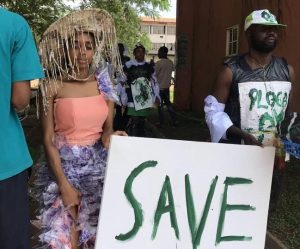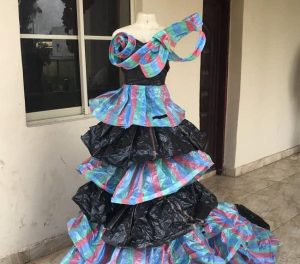Against the backdrop of the global concern on the menace of plastic pollution, the Plogging Nigeria Club at the University of Nigeria, Nsukka, has concluded a four-day exhibition to show how plastic litter could be used to create aesthetic home decorations and fashionable wares.

The club, which has over 150 members consisting of staff and students of the university, started in 2019 with the objective to create awareness on sanitary waste management practices in the university community and its environment.
The club has since 2019 mounted various advocacy programmes on waste management and sensitisation on climate change, including a general clean-up campaign which was aimed at clearing litters of plastic waste around Nsukka campus of the University of Nigeria.
“Our advocacy was not producing the desired behavioural change on the staff and students, so we decided to use the exhibition and performing art as alternative advocacy to cause the change,” Ayodeji Omilabu, the founder of Plogging Nigeria, said.
Omilabu said that the exhibition, called “Trashion Week”, was meant to showcase artistic creations made from recycled and upcycled materials such as pure water sachet nylon, plastic bottles and papers.
“The exhibition aims to promote sustainability, raise awareness about the environmental impact of waste, and celebrate the World Environment Day which had ‘Beat plastic pollution’ as its theme, and the potentials of creative arts in reinforcing environmental education,” he said.

Omilabu believes that, by showcasing Tashion Art, individuals could be inspired to adopt eco-friendly practices and encourage sustainable fashion choices.
He added that the exhibition fair provided a platform to celebrate the creative potential of repurposing waste materials, fostering an appreciation for artistic expression and innovation.
“Through the power of art, we aim to influence public opinion and encourage collective action towards addressing the environmental crisis,” he said.
Omilabu said that, in 2020, the club picked and recycled over 500kg of plastics from the university community and another 200kg was due for recycling.
The exhibition was a collective effort of some individuals, including Glory Udo Aka, the project Trashion Coordinator; Ugonna Ibekwe, the Trashion Exhibition Curator, Miracle Sopuruchi Obiora; and a host of other supporters.
